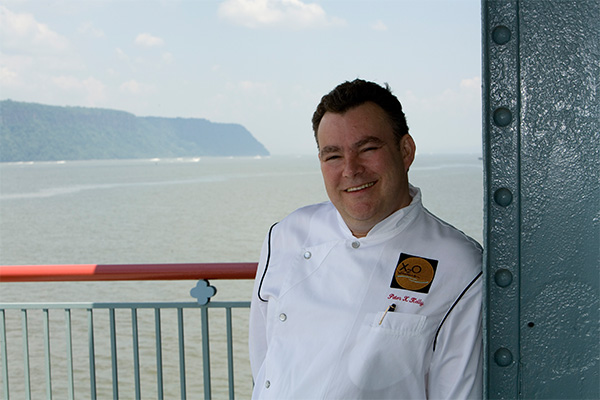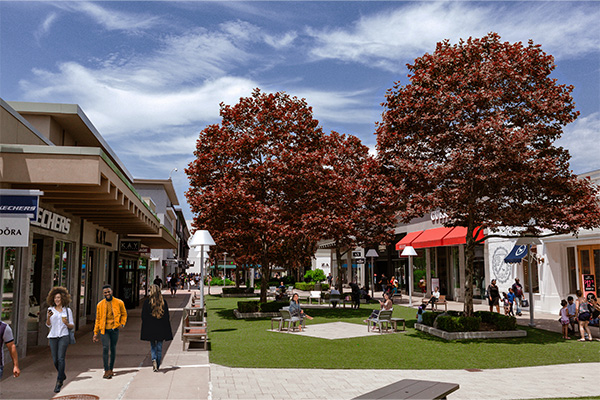Yonkers-born chef and restaurateur Peter X. Kelly is the 10th of 12 children. He started in the food industry by washing dishes at a small German restaurant, where everything was made in-house. In
1983, at age 23 and without any formal training ”” although he had studied business administration at Marist College in Poughkeepsie — he opened his first restaurant, Xaviars, a lucent, pastel space at the Highland Country Club in Garrison. The New York Times called it a “find,” while our editor remembers rose-strewn Mother”™s Day buffet brunches there, topped by a molten white chocolate mousse that continues to melt in memory.
After Xaviars ”” named for the “X” in Peter X. Kelly ”” he went on to open several more places, including X20 Xaviars on the Hudson in Yonkers, where our editor, again, enjoyed a six-hour, Champagne-filled birthday dinner in which her stepmother and aunt flirted with guys on jet skis on the river. Among many industry achievements and honors, Kelly has appeared on “Iron Chef,” won a James Beard award for Best Chef: Northeast, was inducted into Nation”™s Restaurant News”™ Fine Dining Hall of Fame and has given the commencement address at the Culinary Institute of America.
As gracious to patrons and journalists as he is to those in need, Kelly recently answered some questions for us:

Photograph courtesy Peter X. Kelly.
At the tender age of 23 and famously self-taught, you opened your first restaurant. How on earth did you get started?
“I traveled to France to sit in some of the 3-Michelin star restaurants to see what “world class ” meant. I got out the books and poured myself into learning the classics. I sold my car and took every penny I had saved and opened the restaurant, Xaviars, at Garrison in 1983 as the chef and never looked back.”
That”™s an amazing story. What happened after you opened?
“We attracted a lot of media attention. The New York Times caught on to us early. There was a section, the Living section, which is where restaurants were then, and it came out on a Wednesday. We got a cover picture of our outdoor terrace, and it was a “find” for The Times. We went from doing five covers to 105 the next day. It put us on the map. Then Zagat came out and we were off. Well, that was a long time ago and we have since opened several restaurants.”
And what was your second act, so to speak?
Our restaurant in Piermont, (Xaviar”™s at Piermont), which we opened in 1987. It was the first restaurant outside Manhattan to receive an extraordinary, four-star review. That was a big deal. And at the same time we got Zagat”™s 29 rating ”” the highest they ever gave (out of 30). Having the critics”™ stamp of approval by The New York Times and the people”™s stamp of approval from Zagat was very compelling for us. We felt we had arrived.”
But it didn”™t stop there, right?
“We opened a restaurant in Congers and then later got approached to look in Yonkers. I mean, we didn”™t need another restaurant. But having the opportunity to see if a restaurant could have a significant impact on a community was a compelling reason to open there. And, in some way, I hedged my bet by putting it on the water.”
Oh yes, tell me more about that. Because it”™s well-known in the industry that great views and great food don”™t usually go together.
“Precisely. The closer you get to the water, the worse the food gets. But I figured people would come eventually. What I didn”™t know was that, in those days, people didn”™t even know there was a waterfront in Yonkers.”
But you went ahead regardless?
“I wanted to change that dynamic. So, we built this restaurant, tried to make it the best we could ”” but it was risky. We started in 2001, but it took six years to open the restaurant. We didn”™t get going till 2007. And, at that time, a lot of people were starting to look at Yonkers, with a lot of smaller developers coming in. But when the economy went south in 2007, all those developers pulled out. And it”™s taken till now, really, to come back, with much deeper-pocketed national developers, people like RXR, AvalonBay, who are developing the area now.
“I have to give great credit to the current administration, Mike Spano and his team. They”™ve done a very good job, and also Wilson Kimball, who was the economic developer at that time. She recognized the potential. You know, Yonkers is a very special place. You don”™t go anywhere in this country ”” in the world ”” where someone hasn”™t heard of Yonkers”.
I agree ”” it”™s quite extraordinary.
“It”™s amazing. It was really the first suburb of Manhattan.”
And a very wealthy suburb, which you can tell by the architecture around the city.
“And a very wealthy suburb, right. One trip to Untermeyer Gardens (Conservancy) and you can see what was there.”
And was there also the sense that, being one of 12, there was competitiveness and you really wanted to do well on your home turf?
“Of course, there was some of that. But really, it was having the opportunity to open in Yonkers and just to see what would happen. I remember bringing my brother Ned (the floral designer) down. He”™s the closest to me in age. I said, ”˜I want to show you something I”™m thinking about.”™ And we were on this sort of recreational pier that was completely dilapidated, and we stood on it and he went, ”˜Yeah?”™ and I said, ”˜I want to build a restaurant here.”™ And I”™m looking south to the George Washington Bridge and north to the Tappan Zee and out to the Palisades and he says to me, “Peter, the family worked so hard to get us out of here. What do you want to do, drag us all back?”
That”™s very funny, and even a little poignant. But back to the present day, I know that you”™ve recently been through a transition ”” and let”™s face it, who hasn”™t during Covid? But fill me in on what restaurants you have now.
“Right now, we have two ”” Restaurant X and Bully Boy Bar in Congers and X2O in Yonkers. We also have a catering company. I look on Yonkers as a sort of urban restaurant and Restaurant X as our country restaurant. Of course, they have similarities, but the feel is different in each one.”
And I know you”™re also very involved with the community. Can you tell me about your civic work?
“I try to participate wherever I can. whether it”™s actually cooking in the location where the organization is, or whatever. (We”™ve worked with) many hunger relief programs”” Feeding Westchester, Coalition for the Hungry and the Homeless, before the groups were combined ”” all very important. And we do a lot of work with the churches and Little Sisters of the Poor. I come from a very Catholic background, with two uncles that were priests and two aunts that were nuns, so I”™m drawn to that.”
You”™ve got good credentials there, that”™s for sure.
“Well, I don”™t know if they will help ”” and, of course, I need all the help I can get. But seriously, one of the things I”™m very proud of, near Presbyterian Hospital up in Cortlandt, we built the Peter X. Kelly Teaching Kitchen, which works with the community, the high schools and grammar schools. We bring kids in and teach them how to cook a healthier snack. And we work with hospital staff in creating diets for whatever the issue may be ”” whether it”™s cardiac or diabetes, or teaching seniors how to cook at home, in a more appropriate way than they may be used to.”
Do you see any new restaurants on the horizon, perhaps new cuisines you want to explore?
“No plans to open any new restaurants. The two restaurants we currently have are big restaurants, each with 250-seats. So, it”™s enough. I do get asked quite often to consult on projects, so I”™ve been doing more of that.”
And your thoughts on the pandemic ”” in the restaurant sense. Are there protocols that will remain in restaurants once Covid ”” with any luck ”” recedes or disappears?
“The mask thing will fall away at some point but the sanitizing, the disinfecting, that”™s all here to stay. And I think that”™s a good thing. People understand better now how important those things are.”
And the staff shortages we keep hearing about?
“When the pandemic hit, so many looked and said they could be doing something else, have weekends off, spend time with their family. They won”™t be coming back. The industry has to be in your blood. You have to enjoy coddling guests. (But just as) there”™ll always be people that want to experience great food and wine and great spirits, we”™ll always find good people who like to make them happy, whether waiting on them or cooking for them.”
You clearly still enjoy cooking.
“You know, there”™s nothing like cooking for somebody. It”™s a very sensual and special relationship you have with a guest. When I walk into the dining room and meet a guest and they say, “That was so wonderful,” ”” well, not even doctors get that. Doctors might have to wait months and months to find out if they”™ve done a good job, if they find out at all. But for me, well for me, it”™s immediate gratification.”
For reservations and more, visit xaviars.com.






















